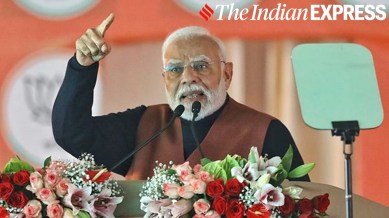📣 For more lifestyle news, click here to join our WhatsApp Channel and also follow us on Instagram
‘I have to control my emotions’: PM Narendra Modi on managing anxiety and how detachment helps him navigate leadership challenges
What are some practical techniques for cultivating detachment without losing empathy or a sense of responsibility?

Prime Minister Narendra Modi, while in conversation with Zerodha co-founder Nikhil Kamath on his podcast recently, opened up and shared insights into managing anxiety during critical junctures of his political career, stressing the role of detachment in maintaining composure under pressure.
Reflecting on key incidents such as the 2002 Gujarat elections, the bombings during his tenure as Gujarat’s chief minister, and the Godhra train burning incident, Modi acknowledged the challenges of staying grounded amid turmoil.
monthly limit of free stories.
with an Express account.
Speaking candidly on Kamath’s podcast called “People,” Modi said, “You see, to manage these things, everyone has his own ability and individual style… I hold such a position that I have to control my emotions — the natural tendency that human beings have, I will have to stay detached from all of that. I will have to rise above all that. For example, in 2002, there were elections in Gujarat. It was the biggest challenge of my life… I never watched TV and didn’t check the results.”
Recounting the moment he learned of his victory, he said, “At 11:00 AM or noon, I heard the beat of drums outside the chief minister’s bungalow. I had told everyone not to inform me till 12 PM. Then our operator sent me a letter saying I was leading with a two-thirds majority. So, I don’t believe that nothing affected me that day, but I had a thought to overpower that feeling. You can say that there was restlessness and anxiety inside me.”
Modi also recalled his response to the bomb blasts in Gujarat, sharing how he defied security warnings to visit hospitals and the police control room. “There were bombings in five places. My team advised against visiting, citing safety concerns, but I insisted. I felt a sense of responsibility to be present.”
Similarly, during the Godhra train burning incident, Modi described grappling with the emotional weight of the situation. He said that the sight of several bodies, when he reached Godhra, was overwhelming, and that as a human, he felt the pain. “But I knew I had to rise above my emotions to lead effectively and I did whatever I could to handle myself,” he said.
The role of detachment in crisis management
Sonal Khangarot, a licensed rehabilitation counselor and psychotherapist at The Answer Room, told indianexpress.com that detachment, in psychological terms, involves maintaining emotional distance from outcomes. “Modi’s approach reflects this principle, allowing him to focus on the bigger picture without being consumed by stress. Techniques like reframing thoughts, central to Cognitive Behavioral Therapy (CBT), can similarly help reduce emotional reactivity,” she said.
Research also indicates that detachment in high-stress situations can lower cortisol levels (the stress hormone), aiding in better decision-making and preventing burnout. However, Khangarot cautioned against excessive detachment, which might hinder empathy and genuine connections. “It’s a balance. Leaders must remain invested enough to inspire trust while detaching enough to handle setbacks with resilience,” she said.
Strategies to cultivate detachment without losing empathy
Detachment is not indifference—it’s about creating mental clarity to tackle challenges objectively. Khangarot suggests the following practices:
- Mindfulness: A 2019 meta-analysis in Psychological Bulletin found that mindfulness significantly reduces anxiety and improves emotional regulation. Regular mindfulness meditation enhances awareness and teaches individuals to observe thoughts without judgment, helping leaders stay calm under pressure.
- Focusing on controllables: Anxiety often stems from worrying about factors beyond one’s control. Detachment involves recognising what can be influenced and releasing attachment to outcomes.
- Mental reframing: Shifting the narrative from “Why is this happening to me?” to “What can I learn from this?” fosters resilience and minimises over-identification with problems.
- Scheduled reflection: Allocating time for reflection enables emotional processing without allowing stress to dominate other aspects of life.
While Modi’s reliance on detachment may seem unconventional, it underscores the significance of emotional discipline in leadership, inspiring broader conversations about managing stress without losing one’s humanity.
📣 For more lifestyle news, click here to join our WhatsApp Channel and also follow us on Instagram